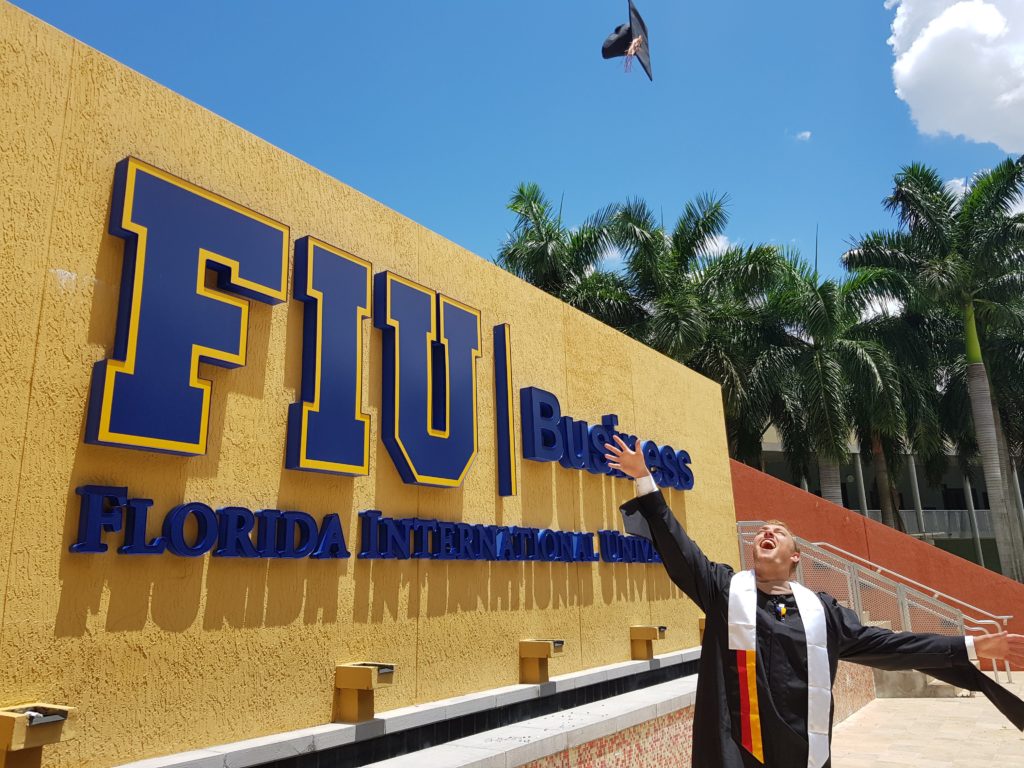Wiebke Lehnert: Yes, these are interesting factors that must be considered if you want to combine studying and professional sport. But it also shows that there are some exciting opportunities for professional athletes like you that, as a casual athlete, I didn’t really know about. That’s fascinating. Lucas, I think that things were very different for you, weren’t they? As you told us, you only really decided to pursue professional sport when you moved to Munich. And, if I’m right, your sporting activities have always run alongside your studies and, even today, you’re still active at a high level.
Lucas Kröger: Yes, exactly. So, I decided to pursue professional sport because everything just seemed to fall into place. To paint a picture for you, I’d say I always did about four to five hours of handball training per day. And, unlike Heiner, I was doing it in the evening, not in the morning. And those four hours per day was just team training, time spent at the club, not including the work everyone put in individually. Matches took place on weekends. The matches were usually in southern Germany; we traveled over as far as the Saarland a lot as well as to eastern Germany and then all the way up to Berlin, and so on. It took up the entire weekend. It required a lot of coordination, because I had to reconcile normal life, my friends, my studies and everything else with sport. I had to adjust a lot to get it to work as it does now. I had a girlfriend in Frankfurt for a while and we also had some away games in the area. I would always travel a day earlier, spend the night with her and then drive half an hour to the game the next day before driving back to hers and then returning to Munich on Sunday – and getting back to my studies. There really is an awful lot to coordinate. The club in Fürstenfeldbruck made it possible to combine everything because they’re sort of set up with this in mind. I’ve already mentioned that handball is more popular in northern Germany than in the south, which means that not many handballers end up in Munich and the sport isn’t as mainstream. So, the club relies on students deciding to move to Munich and being attracted by the opportunity for elite sport in Fürstenfeldbruck. As a result, I’ve played with a lot of students there and it has worked out.
I’d also like to say something about the ups and downs. Of course, the ups are fair obvious: the victories, the promotions, and all the good feelings that come with it. However, there are a lot of downs, too. For one thing, there are the injuries, as Heiner and Max have already mentioned. To my mind, though, another part of team sport is the fact that I’m reliant on the team and the team is reliant on me – and so it can also be a bit of a downer if you’re sitting on the bench at the weekend. It isn’t quite as bad in handball as it is in soccer because you don’t sit on the bench the entire time and you can make a lot more substitutions, but it can still be really frustrating at times. As a goalkeeper, something that’s really annoyed me for some time is that it’s so cold in winter and I stand right at the back, which means I’m on the receiving end of things – I just get the ball fired at me, basically. So, if it’s cold in wintertime, you’re frustrated and you’ve not warmed up properly, it can hurt a lot more when the ball hits you! (laughs) And it’s not great, because that can really get you worked up. Another down, in relation to my studies, was that I was more or less forced to miss out on weekend trips with my classmates – going skiing and so on – because I just didn’t have any time. And then I would always see the photos and have to call my friends to find out what they’d been up to. That’s pretty rubbish. A good friend of mine always talks about going out partying in Munich. I would always catch them up later in the evening at 11:00, 11:30, 12:00, with my handball bag in tow, which I’d have to leave in the cloakroom of the club! (laughs) That’s sort of the image that’s stayed with me. Despite all of that, I really enjoyed it because the handball club became a sort of second family for me; I spend so much time there and everyone has grown to be so close together that it’s only natural.
Wiebke Lehnert: Thank you for your insights, that’s really interesting. Lucas, during your time abroad, you always played handball with other clubs and in other leagues. During your semester abroad in the USA in 2019, you even won the US Men’s Elite Handball Nationals with San Francisco CalHeat. Could you tell us a bit about that? How does it all work when you’re abroad? Do you just go to a team and introduce yourself? Funnily enough, you weren’t even studying in San Francisco but in Florida.

Lucas Kröger: Yes, that’s exactly right. The story is actually connected to the fact that I had originally decided against pursuing a professional sports career but that it just seemed to work somehow in Munich. That decision just seemed to run on like a golden thread: I opted for a dual degree with Florida International University in Miami and, in doing so, sort of gave up professional sport in Munich. I can still clearly remember visiting my grandparents in Berlin when suddenly, at 5 am, the phone went and it was the coach and another player from this team in San Francisco. They had read somewhere, in the Süddeutsche Zeitung I think, that I was moving to America. They wanted to know whether I would play for them. So, we set everything in motion and the coach contacted me again on my second day in Miami to talk everything over in more detail. I have to admit, though, handball in America is a pretty different sport. Each team has a mixture of world-class and ninth-division players because they’re dependent on players coming over from Europe as the sport isn’t too established in the USA yet and hasn’t grown much yet. That means that there’s not many teams in the USA and you know what a huge country it is… If I tell you – as you mentioned – that I was living in Miami but playing for San Francisco, you can imagine the distances involved. It’s opposite sides of an entire continent. As a result, the sport is primarily played in tournaments. So, there’s tournaments once or twice a month and the team flies in, staying in a hotel for the duration of the tournament. My first tournament for them was in Chicago. I flew from Miami to Chicago to play for San Francisco! It was pretty crazy for me to begin with but I soon found my feet and it was really cool after that. I’m a real fan of this internationality and the blend of cultures that’s very prominent in the USA. And yes, as you mentioned, at one point I became an US champion with the team. That was in Myrtle Beach, in South or North Carolina, right on the coast. It was pretty cool. New York and Los Angeles, two fierce rivals, have usually been the winners – and when we won, I think it was the first time in 10 years that any team apart from New York had become champion. And I was able to play a part in that, which is also due in small part to the fact I’m a goalkeeper. San Francisco had been missing a goalkeeper at the time, so I was able to make the position my own, which was really cool. The whole thing just kept going, really. I’m living in France now, in Bordeaux, and I’m playing for Girondins de Bordeaux, the local elite team. And it’s just as much fun. That’s a bit of a gap that I’ve found for myself: to combine elite sport, where I already had experience, with this international background and focus. It allows me to position myself really well and it’s sort of like a side job for me. (laughs)



